
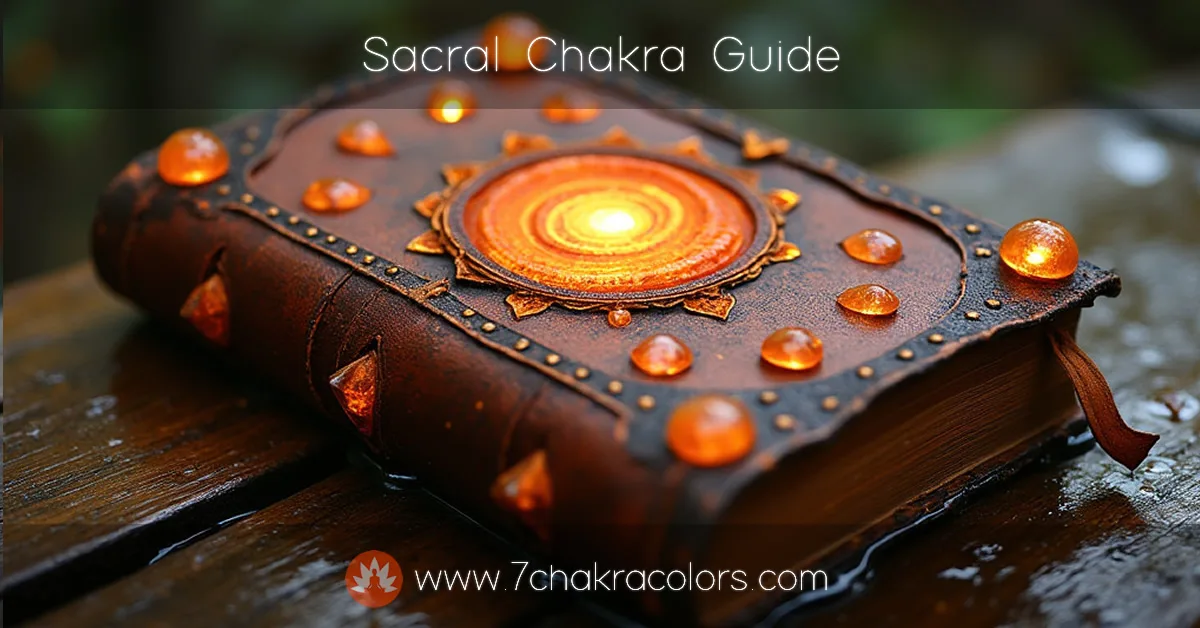
Explore our comprehensive guide to the Sacral Chakra, including its meaning, location, and properties. Learn to identify and heal blockages, recognize opening symptoms, and unlock your creativity with affirmations, meditations, yoga poses, and a balance test. Discover how to enhance your emotional well-being and creative flow.
Your second chakra - the Sacral Chakra - sits right in your lower belly. About two inches below your navel, give or take.
If you want to get technical about it, we're talking the lower lumbar vertebrae around L4-L5 and the sacral region. But honestly, just put your hand on your lower abdomen. That's where it lives.
Focus there for a second. The energy pools in that space - sometimes you'll feel it spread wider across your belly, sometimes it reaches back toward your sacrum. Depends on the day.
This is your flow center.
Svadhisthana. It handles everything that needs to move through you - creativity, emotions, pleasure, sexuality. All the stuff that refuses to stay still. Where rigid patterns dissolve and something new can actually emerge.
And yeah, this one gets blocked constantly. People shut down feelings, ignore creative impulses, disconnect from pleasure entirely. All that suppression? It settles right here. Turns what should flow like water into something dense and stuck.
The energy here doesn't move up or down like some other chakras. It moves in circles, in waves. Like water finding its way around rocks.
When it's open, things process naturally. Feelings move through instead of getting stuck. Ideas show up. Desire feels straightforward instead of tangled up in shame or fear.
A balanced sacral chakra means you're comfortable with change. With actually feeling things. And your creative energy isn't just about making art - though it can be that too. It's how you solve problems. How you show up in relationships. How you approach life when things get messy.
Most people walk around with tension here and don't even realize it.
That knot in your lower belly that never quite releases? That tightness sitting there under everything else? Usually your sacral chakra holding onto something it desperately needs to let go.
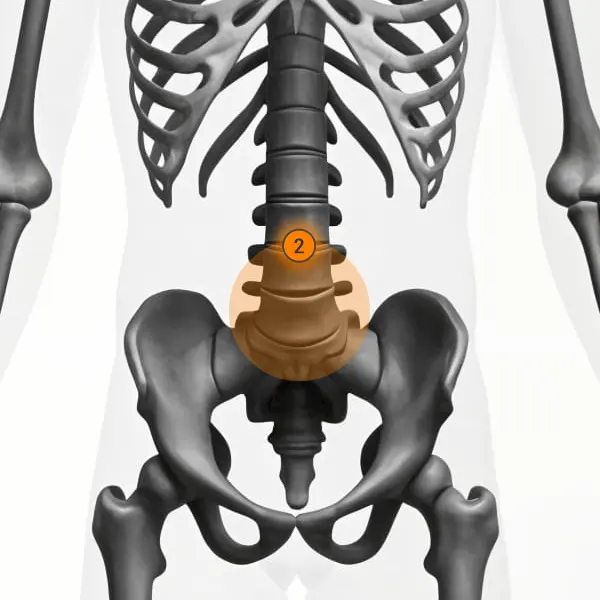
Diagram is showing where sacral chakra is located on your spine (orange dot 2) and where the energy of the sacral chakra can be felt when you concentrate on it (transparent orange circle)
Svadhisthana. In Sanskrit, that basically means "your own place" - the spot where you actually live, energetically speaking.
Two parts to it:

So you've got this center of creative, feminine energy - the force behind creation itself. Reproduction, birth, making something new exist that didn't before. Life creating more life.
Sexuality. Creativity. Sensuality. Those are your core themes here.
Opposites meet here and somehow work together. Male energy, female energy. Solar, lunar. What's structured and what flows. They stop fighting and start collaborating.
Your root chakra gives you solid ground to stand on.
Your sacral chakra?
That's what makes you actually want to get up and explore. The pull toward new things. The difference between just getting through your days and actually living them.
You sense something. Feel something about it. Then try to understand what you're feeling. All three move through this chakra - which explains why it gets overwhelmed so easily.
And here's what matters - happiness isn't just a nice bonus. It's fuel. The ability to feel pleasure, to play, to get lost in something creative - that's what keeps you learning, growing, making things. Without it, everything gets mechanical and dead.
The sacral chakra resides in the lower lumbar region at the sacrum (around L5 vertebra), positioned between the root of the spine and the solar plexus - just above the reproductive organs and below the navel.
When meditating on this energy center, you may experience a sensation of gently sinking into a vast, tranquil darkness - an intimate sanctuary within yourself where complete safety and peace reside.
Its location in the energy body is just above the root chakra from which it draws the pure nurturing energy of the earth.
In Shvadhishthana this energy is transformed through the principles of creativity and sensual joy of life and is further supplied to the third chakra center - the Manipura.
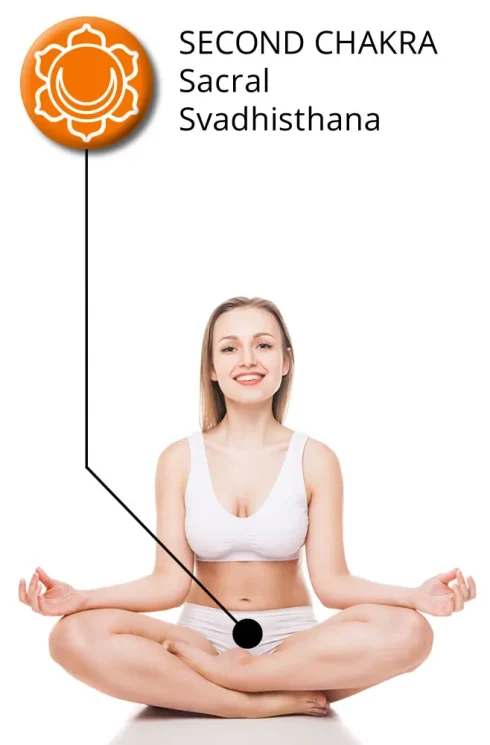


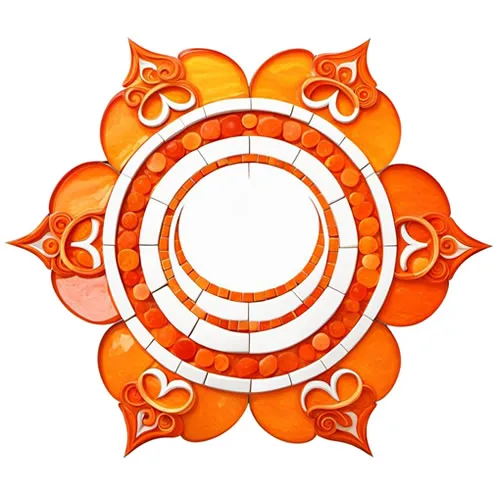
The sacral chakra symbol - a crescent moon sitting inside a circle, six petals fanning out from the edges. Svadhisthana. Each part tells you something:
Crescent Moon: Water. Movement. Your emotions refuse to hold still - they shift, rise, drop back down. Like tides that won't stop pulling in and out.
Circle: Birth, life, death, repeat. The cycle that never stops. Everything that comes through this chakra follows that same pattern - creation, peak, dissolution, creation again.
Six Petals: Each petal represents one of the shadow emotions that live here. Anger. Jealousy. Cruelty. Hatred. Pride. Desire. You're not supposed to eliminate these - you balance them so they don't run the show.
Color: Orange. Not the pale kind - vibrant, warm orange. It matches the energy here: creative, emotional, alive. That warmth you feel when something lights you up? That's sacral chakra orange.
Water is the symbol here. Movement, fluidity, flexibility - everything the sacral chakra does. Life doesn't hold still, and neither does this energy center.
The crescent moon matters too. Female energy, lunar pull, the part of you that operates below conscious thought. Your subconscious lives in that crescent.
Six orange petals around the outer edge. That orange glow? It's impulse energy. The thing that pushes you to make something new, to actually participate instead of just observing your own life.
The crocodile represents this chakra. Makes sense when you think about it - lives in water, ancient predator, pure instinct operating under the surface.
It represents the raw creative force down here. Not the polished, finished-product kind of creativity. The primal urge to make something, change something, survive and reproduce. That's crocodile energy.
Water animal, obviously. Which connects to emotional flow, adaptability, moving through environments that shift constantly. Watch how a crocodile moves - it doesn't fight water, it uses it. When your sacral chakra's working right, you do the same thing with emotions. Ride them instead of wrestling them into submission.
There's also that stillness they have. Patient. Powerful. Then boom - they move when the moment's actually right. Your sacral chakra works best the same way. Not forcing, not manufacturing urgency. Just waiting, then acting.

Fish show up here too. Abundance, fertility, moving through water without effort. They represent that flow state where self-expression comes naturally - not forced, not calculated. Just swimming.
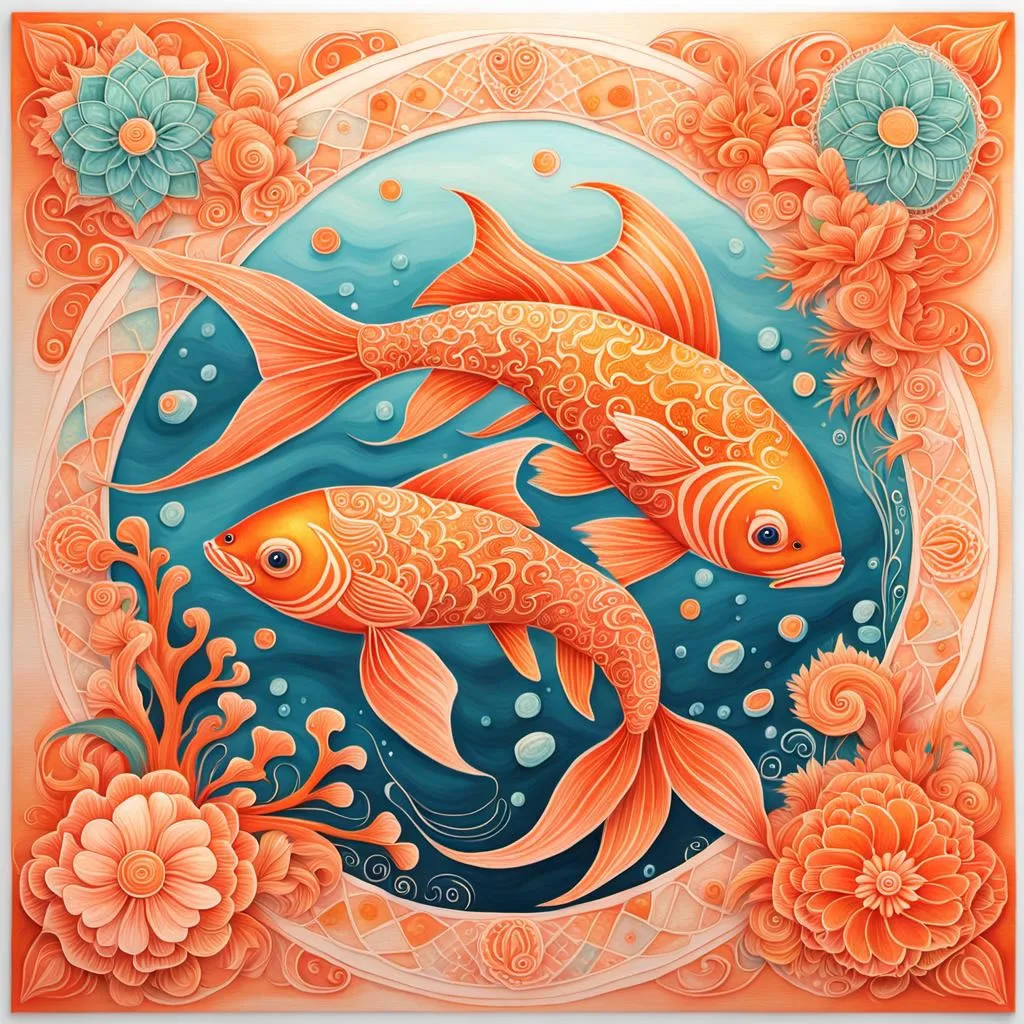
The dolphin brings something different. Playfulness. Intelligence. Deep social bonds. Crocodile gives you primal power, fish gives you effortless flow, dolphin gives you joy and intuition. And that playful approach matters more than most people think - you can't heal emotions by treating them like serious problems to solve. Sometimes lightness works better than intensity.
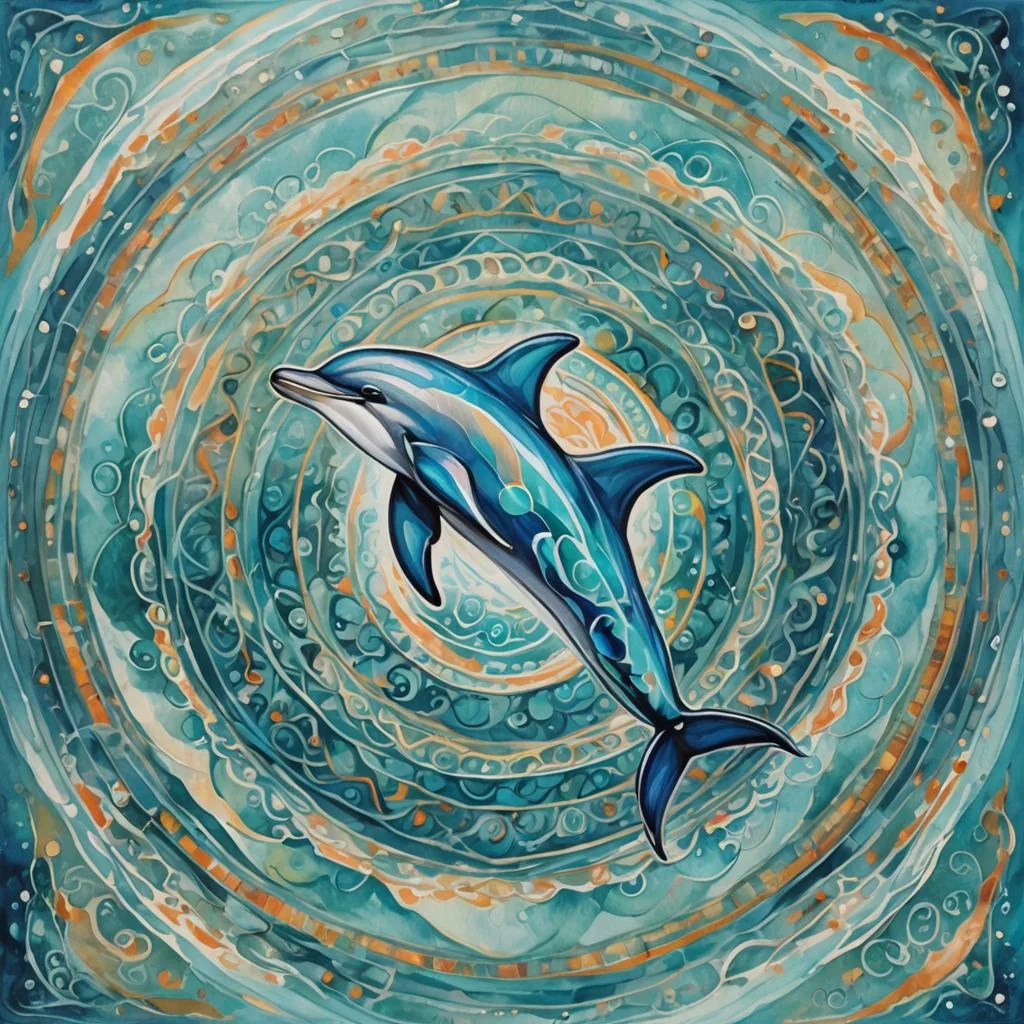
Three animals, three different aspects of what this chakra does. Crocodile for raw creative power. Fish for natural flow and abundance. Dolphin for playful connection and emotional depth. Balance all three and your sacral chakra has what it needs.
When your sacral chakra gets blocked, things start breaking down. Emotional instability. Creative drought. Relationships feel harder to navigate or maintain.
This is the center that handles emotions, sensuality, creativity - so when it's jammed up, you'll notice guilt showing up more, shame settling in, motivation dropping off. Physically? Lower back pain, urinary issues, reproductive system problems. The body doesn't lie about energy blocks.
To clear it, you need movement that connects you back to feeling and creating. Dance. Art. Writing. Anything that gets emotions moving through you instead of sitting there stuck.
Hip-opening yoga helps - Bound Angle pose, any stretch that releases tension in your pelvis and lower back. Your body stores emotional blocks physically, so you've got to address both.
Affirmations work if you mean them. "I embrace change and growth" or something that resonates with where you actually are. And meditation focused on orange light in your pelvic region - visualize energy flowing there, clearing what's stuck.

A sacral chakra test tells you whether this energy center is flowing or stuck. Pretty straightforward way to check in on your creativity, emotional state, and how you handle intimacy.
This chakra runs how you express yourself and connect with people. When it's blocked, things show up: lack of inspiration, withdrawing socially, that constant need for someone else to tell you you're okay.
The questions usually cover emotional patterns, openness to trying new things, comfort level around other people. Nothing complicated - just honest assessment of where you actually are.
Your answers show you what needs work. Maybe you need more creative outlets. Time near water. Affirmations that actually mean something to you - "I'm open to joy and pleasure" or whatever lands right.
Testing is just the starting point. Tells you where you are so you know what to adjust.
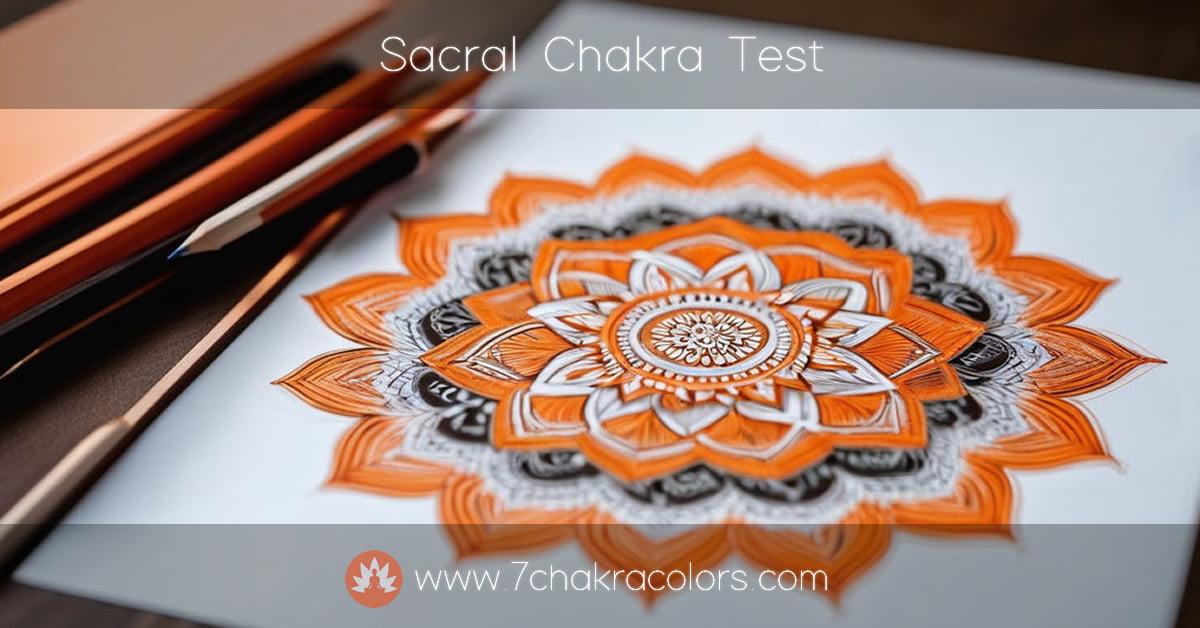
An open sacral chakra changes how you move through life. Creativity flows. Passion shows up naturally. Your emotions stay balanced instead of swinging wildly.
When this chakra's working right, inspiration comes easier. Connections with people feel deeper, more real. You can enjoy pleasure without guilt or weirdness attached to it.
Your emotions process instead of piling up. Challenges don't flatten you - you bend, adjust, keep moving. And creative energy doesn't just sit there as potential - it actually produces things.
Keep it balanced by staying present. Create something regularly, even small things. Invest in relationships with depth, not just people you exchange pleasantries with.
When this chakra's open, you stop spectating your own life. Confidence comes from inside instead of needing constant reinforcement. Things change and you adapt without falling apart. Fulfillment stops being this thing you chase and becomes something you actually experience.

Crystals work on the sacral chakra. Different stones, different effects - but they all help move energy that's gotten stuck.
The orange ones match this chakra's vibration. Carnelian. Orange Calcite. Tiger's Eye. Sunstone. They each handle different issues - blocked creativity, emotional turbulence, instability, lost sense of your own power.
Carnelian pushes courage and motivation forward. Orange Calcite calms emotional storms and makes space for actual change to happen.
Tiger's Eye grounds things while offering protection - keeps energy balanced instead of scattered. Sunstone brings back joy and that sense of power that comes from inside you, not from external circumstances.
Carry them, wear them, hold them during meditation. However you work with these stones, the goal's the same - clear what's blocking the chakra, restore the natural flow of passion and creative energy, let yourself express what's actually true for you.
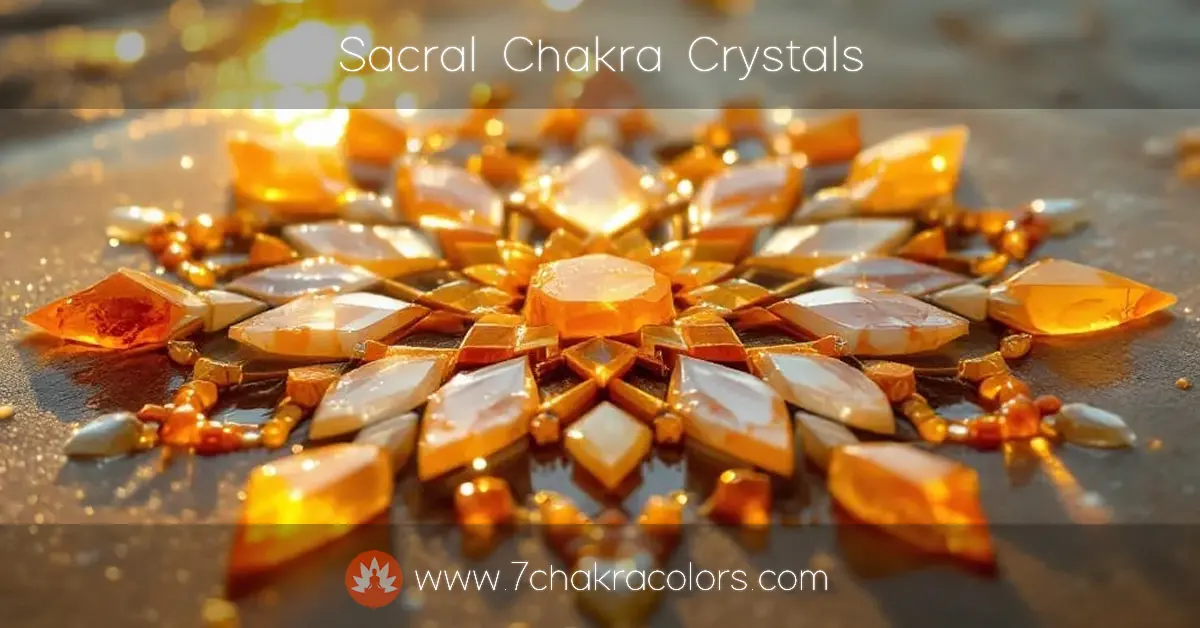


Meditation on your sacral chakra hits that energy spot below your navel. Addresses the emotional mess, the creative drought, the way most people have cut themselves off from actually feeling pleasure.
Find somewhere to sit. Focus on that spot about two inches below your belly button. Visualize orange light there - warm, glowing, alive.
Breathe in and watch that light expand. Fills your lower belly, spreads through your pelvis, moves up your spine. Each inhale makes it brighter.
Exhale and release whatever's stuck - old emotions, creative blocks, shame around pleasure. Let it drop out of you. Make room for energy to actually move.
Add affirmations if they help. "I embrace my creativity." "I honor my feelings." Whatever resonates. But only if you mean it - empty repetition doesn't do much.
Do this regularly and things shift. Emotions level out instead of spiking randomly. You figure out what you genuinely want versus what conditioning told you to want. Passion becomes accessible again instead of buried.

Affirmations can shift sacral chakra energy when you actually mean what you're saying. They work on creativity blocks, emotional stagnation, relationship patterns.
"I embrace my creativity and passion." "I'm open to joy and pleasure." "I honor my boundaries and express what I need." Repeat these, but only if they resonate. Empty words don't move energy.
The point isn't just positive thinking. It's rewiring how you relate to yourself - accepting where you are, unlocking creative flow, balancing emotions that swing too far in either direction.
Do this regularly and something changes. You connect with what you actually desire instead of what feels safe or acceptable. Relationships get easier because you're not performing or hiding. Emotional energy moves instead of pooling in stagnant places.
Over time, you trust yourself more. That fear around being emotionally vulnerable starts losing its grip.
Keep at it and you build real emotional resilience - not the fake kind where you pretend everything's fine, but the kind where you can handle what comes because you're not fighting your own feelings.
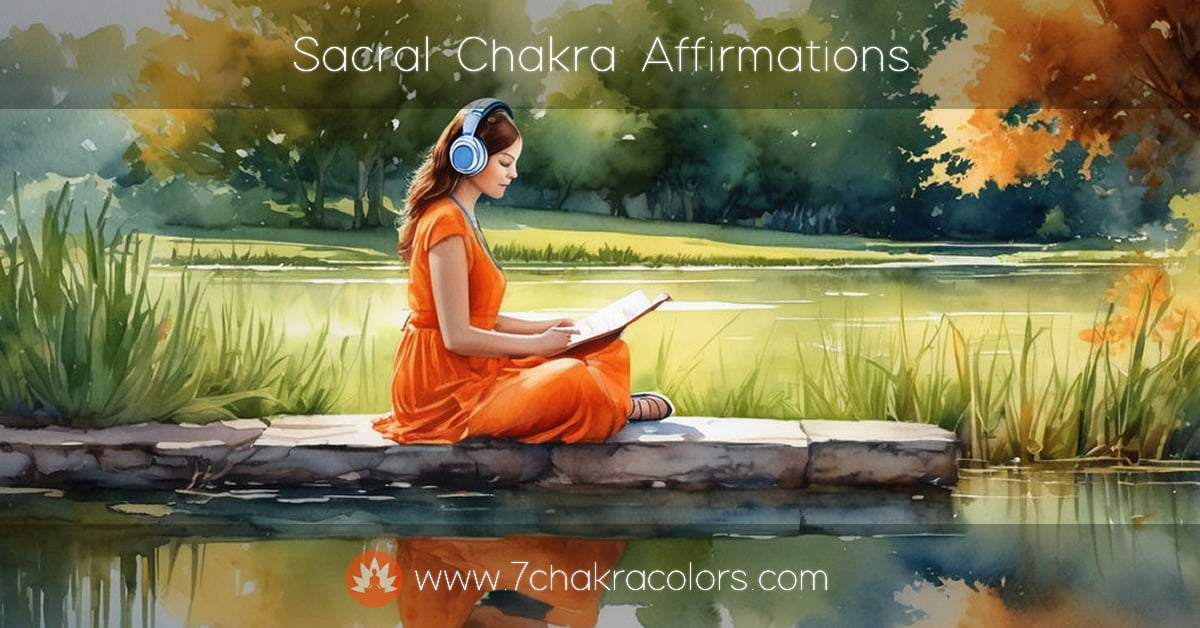
| Main Names | Sacral Chakra, Second Chakra, Svadhisthana, Creative Center |
| Meaning of "Svadhisthana" | From Sanskrit, meaning "one's own place" |
| Location | Lower abdomen, about two inches below the navel |
| Corresponding Gland | Gonads (ovaries in women, testes in men), which produce hormones |
| Color | Orange |
| Sound/Mantra | VAM (chanting or focusing on this sound can help balance the Sacral Chakra) |
| Number of Petals | Six petals, each with one of these Sanskrit syllables: वं (vaṃ), वं (vaṃ), शं (śaṃ), षं (ṣaṃ), सं (saṃ), and बं (baṃ) |
| Primary Themes | Creativity, sexuality, pleasure, emotions, and relationships |
| Positive Aspects | Joy, passion, flexibility, sociability, and creativity |
| Negative Aspects | Guilt, fear of change, emotional instability, and dependency |
| Associated Body Parts | Reproductive organs, kidneys, bladder, and lower back |
| Common Physical Ailments | Lower back pain, reproductive issues, urinary problems, and pelvic pain |
| Mental and Emotional Issues | Fear of change, emotional instability, and feelings of inadequacy |
| Element | Water |
| Primary Symbol | Circle |
| Animal Symbols | Crocodile, fish, and other water creatures |
| Associated Sense | Taste |
| Deities | Shakti, Durga, and Saraswati |
| Frequency | 288 Hz |
| Affirmations | "I embrace my emotions." "I allow pleasure in my life." "I am creative and inspired." |
| Crystals | Carnelian, Orange Calcite, Moonstone, Amber, and Tiger's Eye |
| Essential Oils | Ylang Ylang, Sweet Orange, Sandalwood, Neroli, and Jasmine |
| Yoga Poses | Hip-Opening Poses (like Pigeon Pose), Goddess Pose, Bound Angle Pose, and Seated Forward Bend |
| Mudras | Yoni Mudra, Apan Mudra, and Prana Mudra |
| Dietary Suggestions | Fresh fruits, nuts, seeds, and foods that are orange in color (oranges, carrots) |
| Positive Spiritual Traits | Joyfulness, creativity, emotional balance, and passion |
| Nature Connection | Spending time near water, dancing, and creative expression in nature |
| Season | Fall |
| Associated Planets | Venus and Mars |
| Personal and Professional Traits | Creativity, adaptability, and harmonious relationships |
| Self-Care Practices | Engaging in creative activities, expressing emotions, and nurturing relationships |
| Astrology | Associated with the Moon for emotional depth and intuition |
| Healing Practices | Water therapy, creative expression, and dance |
| Numerology | 2 (symbolizing balance, partnerships, and duality) |
| Relationship Dynamics | Healthy, nurturing relationships, emotional intimacy, and connection |
Second chakra. Svadhisthana. Lives in your lower belly, right below your navel. Runs your emotions, creative drive, sensuality. How you connect with people on a deeper level.
Your emotions swing unpredictably. Change terrifies you. Creative ideas won't come or won't develop. Relationships take constant work and still don't feel right. Sex drive drops. Guilt sits in your stomach like a stone. Your lower back aches. Peeing becomes an issue. Reproductive system acts up.
Get your body moving. Dance in your kitchen. Write without editing. Meditate focusing on your lower belly. Try ylang-ylang or sandalwood. Carnelian and moonstone help some people. Hip openers like Bound Angle get energy unstuck from your pelvis.
Joy lives here. Passion. Desire. Pleasure without guilt. When balanced, you feel safe enough to be intimate and honest.
Orange foods resonate with this chakra. Oranges, carrots, sweet potatoes, pumpkin. Healthy fats matter too—nuts, seeds, avocado. Real nourishment, not empty calories.
Jasmine, clary sage, ylang-ylang, patchouli, sandalwood. Diffuse them, massage into the lower abdomen, or add to a bath. They loosen emotional blockages and restore creative flow.
Relationships stop being exhausting. You express needs clearly. Boundaries hold. Intimacy feels natural instead of threatening or obligatory.
Carnelian is most common. Orange calcite, moonstone, amber also work. Carry them, meditate with them, or place on your lower belly.
Hip-opening poses like Goddess, Cobra, and Pigeon release stored tension and emotions from the pelvis and lower back.
Bright orange. It represents creativity, passion, and vitality. Wear it, surround yourself with it, notice when it appears.
Yes—if practiced consistently. Focus on the area below your navel. Visualize warm orange light. Breathe into it.
This chakra fuels creative flow. When open, ideas move easily. When blocked, inspiration stalls and projects remain unfinished.
Chronic lower back pain, hip tightness, reproductive issues, bladder problems, digestive imbalance.
417 Hz resonates with this chakra. Chanting VAM also helps. Sound vibration breaks up stagnant energy patterns.
Yes. Trauma—especially emotional or sexual—often lodges here. Healing requires feeling and releasing what was suppressed.
This chakra is about flow. Baths, rivers, oceans, and lakes naturally help restore balance.
It governs authentic expression. When blocked, shame censors emotions and desires. When open, expression flows naturally.
Balanced energy allows healthy intimacy. Imbalance leads to avoidance or compulsive seeking—neither is sustainable.